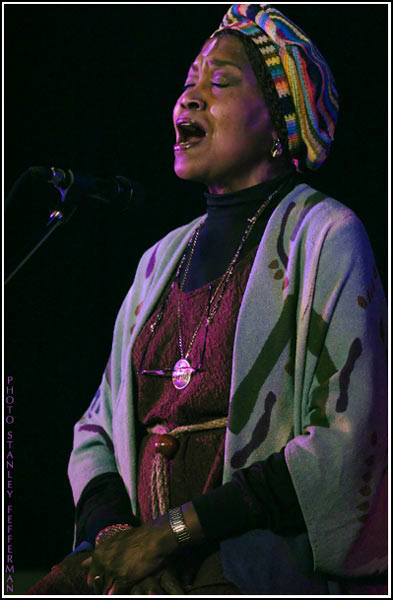 |
|
Odetta
|
| March 5, 2005 • Hugh's Room • Toronto |
|
|
| As ever, Odetta’s shout can ring out like a convict’s hammer busting rock. What’s new is that her blues, as in “Noah’s Dove”, rely more on high tones thin as a whistle that float down like dandelion fluff, and a kind of slow contralto talking style that she's developed. If you could hear the way she did “Careless Love” 50 years ago and last night, you’d get my point, which is that her voice is as awesome as ever, but the artist she is keeps developing ways of using that instrument to reflect her considerable maturity. |
 |
|
Part of her maturity is to transmit the tradition of song she received, especially from Bessie Smith and Huddie Leadbetter, a.k.a 'Leadbelly'. Doing Leadbelly's song “It’s a Bourgeois Town", Odetta minces no words, tells it like it is. The line “Don’t want no niggers” gets this rhyme in response: “…in the land of the free/Don’t want no mistreatment by no bourgeoisie”. Part of her maturity is to manifest and share her lifelong mission to overcome the belittlement of persons and peoples. Odetta begins and ends her set with a sing-along version of “This little light of mine, I’m going to make it shine”, followed by the advice to people who are barely singing in the smallest of voices that “You don’t make anybody bigger by making yourself smaller.” She bolsters her message of opposing belittlement by singing the contemporary South African composer Labbi Sifrey’s “Something Inside So Strong” which contains the lines:” The higher you build your barriers, the taller I’ll become.”
|
|
Odetta no longer stands holding her big Gibson across her chest, hammering out the beat of a locomotive on the way to freedom. She sits, hands folded, like a regal person, and while Seth Farber lays the music down just right, Odetta tells her stories of unemployed workers laid low by T.B., of soldiers returning to a failing economy and begging for work, of Texas ("that’s where the Bush boys hang out") convicts working at near-slave-labour rates manufacturing furniture. She makes the songs she started singing long ago seem up-to-date because the way people behave involves a lot of 'here-we-go-again'. Her songs work because people still need what’s in them: the humour, the playfulness, the sadness, the sharp observations—-“If you ever go to Houston, you had better walk right”—-as consolation and support in these tough times.
Whether Odetta sings old songs or new ones, her phrasing moves so subtly between the beat and the breath, and her shifts of intonation are so unique, that you have to know you are listening to a totally authentic person, even while she’s putting on a show. When the audience rose to applaud at the end of the show, and Odetta and her partner made a slow stately progress out of the room, there was such appreciation that you felt like believing in something.
|
|
|
|
We welcome your comments and feedback
|
|
• • • • • •
|
|
| Report and Photograph by |
• •
|
|
| Stanley Fefferman |
•
|
|
| for The Live Music Report |
•
|
|
|
|
|


